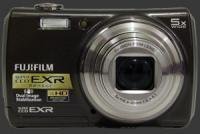Fujifilm Finepix F200 EXR Review
Fujifilm Finepix F200 EXR Performance - How well does it take pictures?
The Fuji Finepix F200 EXR turns in an exceptional level of image quality, better than any camera in its class by a wide margin.
In 12 megapixels High-Resolution mode, image noise is well controlled and negligible up to ISO 400. Going a stop higher to ISO 800, noise is apparent but not really objectionable. By ISO 1600, noise becomes stronger and details get destroyed. It goes downhill from there, which is expected for an ultra-compact. Given that this is already an outstanding performance, the Fuji F200's 6 megapixels Low-Noise takes things even further. It is not quite a full-stop advantage but almost. ISO 800 has only a hint of noise and ISO 1600 is quite usable for a medium-sized print. There are ISO settings from 3200 to 12800 too, but these cannot be used in Low-Noise mode, probably because Fuji could not take it that far.

Color on the Fuji F200 is controlled by Film-Simulation: Provia, Velvia, Astia, B&W or Sepia. Provia is the default setting with natural but gently oversaturated colors. The Velvia setting captures over-the-top colors and is better avoided for anything resembling reality. Astia is the soft setting yet maintains slight oversaturation compared to reality. The white-balance system of the F200 is good but not fantastic. Outdoors is does well but it leaves a noticeable color-cast under artificial lighting. This is the only area where the F200 takes a step backwards from its predecessor. Preset and custom white-balance are very accurate though, so realistic colors can always be achieved.
One key characteristic of Fuji cameras is their excellent dynamic range and the F200 takes this even further. As seen on the Fuji F100fd, dynamic-range is under user control. This time the range goes from 100% to 800%, depending on the mode being used. In high-resolution mode, there are 4 options: Auto, 100%, 200% and 400%. Auto works extremely well, and it should, since the camera's metering system is aware of tonalities. The other settings are dependent on the current ISO setting, with all options available from ISO 400 to 3200. Remember that since all JPEG files have the same bit-depth, increasing the dynamic range reduces scene-contrast since more tonalities are squeezed into the same range of RGB values. High dynamic-range mode gives access to the 800% option, limiting image size to 6 megapixels. At 800%, the Fuji Finepix F200 captures up to 3 stops more highlight details. This is a fantastic achievement.
The metering system is simply superb and manages to balance shadows and highlights very well. This is certainly helped by this camera's exceptional dynamic range. In high-dynamic range mode, it is surprisingly difficult to make it burn-out highlights. This is the most impressive and advantageous of all EXR modes. One thing that users will need to know is that the dynamic range captured by the Fuji F200 is much greater than what can be shown on the camera's LCD screen. As such, wide dynamic range images can appear to be underexposed when viewed on the LCD screen.
This ultra-compact digital camera features an excellent stabilized wide-angle 5X optical zoom lens which is sharp from corner-to-corner. Near the wide-angle side, some barrel distortion is noticeable but it quickly goes away as the lens is zoomed-in. One place where Fuji skimped is on the lens aperture. Instead of a physical aperture which varies the size of the entrance pupil, the F200 slides in a neutral-density filter. This darkens the image for a proper exposure but does not affect depth-of-field. In all likelihood this is also why the F200 has an aperture-priority mode but no shutter-priority mode.

The Fuji Finepix F200 does everything fast. Startup is quick, focusing is incredibly quick, zooming is very fast, shutter-lag is short and shot-to-shot speeds are great. Focusing remains fast down to very low light levels. In Playback mode, everything is also extremely fast, even zooming in on images.
The Fuji Finepix F200 has image stabilization which proved extremely effective at all focal lengths. At both ends of the zoom, there is roughly a 3-stop advantage over the usual hand-held rule-of-thumb. Note that this camera generally prefers to increase the ISO, when the ISO is set to automatic, than to lower the shutter-speed and let the stabilizer handle it. Luckily, there are several automatic ISO modes which allow the user to choose an ISO limit from 400 to 3200. This lets users select which is the maximum ISO acceptable to them.
There are 5 continuous drive modes on the Fuji F200 EXR: Top-3, Final-3, High-Speed Top-12, High-Speed Final-12 and Long-Period. The Long-Period mode is not very useful. It shoots at less than 1 FPS and the LCD remains blank half-the-time. The Top-3 shoots up to 3 images continuously at 1.4 FPS, which is not very continuous. Top-12 mode works similarly but shoots 3 megapixels images at 5 FPS up to a maximum of 12.

Final-3 and Final-12 modes perform similarly to their Top-3 and Top-12 counterparts except that they only save the last 3 or 12 images shot, respectively. These modes are designed for action photography where it is difficult to anticipate the action. Unfortunately there is a significant lag between what the LCD displays and the photographs being taken. Like with its predecessors, Entering playback mode strangely cancels continuous shooting mode. Finally, battery-life is below average, even for an ultra-compact. Particularly, Auto-EXR mode is very battery hungry.
Fujifilm Finepix F200 EXR Conclusion
There is a new champion among ultra-compacts, the Fuji Finepix F200 EXR. Not only does it equal in terms of noise the performance of the F100fd, it adds improved dynamic-range, faster performance and more advanced controls.

While image quality is at its best, with exceptionally low image noise, excellent dynamic-range, accurate colors and good image sharpness, this is one of the most complex ultra-compact digital cameras. Its large number of modes and settings are highly interdependent and items disappear from menus regularly, depending on which other option has been selected. It gets really twisted as settings sometimes change unexpectedly, although it does inform the user of changes to resolution and dynamic range well.
With a 12 megapixels sensor, a stabilized wide-angle lens and manual controls in an ultra-compact body, the Fuji F200 EXR simply has no competition. Add low image noise and superb dynamic-range and you get a unique package. Even though it is not perfect and has its quirks, the F200 stands against cameras outside its league like the Panasonic LX3 and the Canon G10, both of which have far more manual controls than the F200 EXR but significantly lag behind it in terms of image quality.
 |
Please Support Neocamera
All information on Neocamera is provided free of charge yet running this website is a huge endeavor. Purchases made via affiliate links found throughout the site help keep it running and up-to-date. There is no additional cost to you, so please consider buying via these links to our affilates:
If you found any information on this site valuable and did not purchase via our affiliate links, please considering donating via PayPal:
Any amount will be greatly appreaciated. Thank you for your support!
Fujifilm F200 EXR Highlights

Sensor-Size: 8 x 6mm

Actual size when viewed at 100 DPI
| 12 Megapixels Ultra Compact | ISO 100-3200 |
| 5X Wide Optical Zoom | Shutter 1/1500-8s |
| Built-in Stabilization | Full manual controls |
| 1.4 FPS Drive, 3 Images | Custom white-balance |
| 640x480 @ 30 FPS Video Recording | Spot-Metering |
| 3" LCD 230K Pixels | Lithium-Ion Battery |
| Secure Digital High Capacity, xD Internal Memory |
Fuji F200 EXR vs F100fd
Fuji really improved things with the F200, compared to the F100. The EXR sensor maintains the resolution and performance of the SuperCCD HR at 12 megapixels and manages to surpass it at 6 megapixels mode. Noise is lower by between 1/2 and 1 stops in Low-Noise mode. In High-Dynamic-Range mode, we have another full-stop of highlights being captured as well. Additionally, just about every speed measurement is equal to a bit faster with the F200. The biggest speed improvement is shot-to-shot speed which at under 1 second is much more usable.
There are two aspects where the F200 takes a step back from the F100: battery-life and automatic white-balance. While shorter battery-life can be understood, why white-balance has decreased in accuracy is puzzling. Either way, these two issues can be correct by an extra battery or using preset and custom white-balance.

Physically, the cameras look rather similar in every angle but the rear. A larger LCD by 0.3" and much more usable control layout find their way to the F200. The virtual mode dial is gone, removing the slowest EC and WB interface we had seen in recent years.
In terms of functionality, the F200 is much more powerful than the F100. EXR modes, Aperture-priority and Manual mode round out the new capabilities of this camera. The biggest omission to manual controls is manual focus. It would have been nice if Fuji gave Infinity and Hyperfocal as focus modes too.
Updates
2025.01.18

Fujifilm GFX 2025 Lens Roundup
Lens Review roundup of Fujifilm GFX Medium-Format lenses. Quality, performance and handling of the GF20-35mm F/4R WR, GF30mm F/3.5 Tilt-Shift and the GF55mm F/1.7.
2024.11.18

Best 2024 Photography Gifts for Every Budget
Great gifts for photographers and photo enthusiasts selected for every budget among the best products of 2024.
2024.08.07

Eye Protection Tips for Professional Photographers
The four main considerations for professional photographers regarding eyewear.
2024.07.14

Fujifilm X100VI Review
Flagship fixed-lens compact digital camera with a 40 MP sensor and Image-Stabilization, a first for the series. Retro design featuring dual control-dials, plus direct ISO, Shutter-Speed and EC dials. Its hybrid viewfinder can switch between EVF and OVF mode.
2024.05.09

Fujifilm GFX100 II Review
Flagship 102 Megapixels Medium-Format Mirrorless Digital Camera with 8-Stop 5-Axis IBIS, 8 FPS Drive, 8K Video and 400 MP Super-Resolution capture in a weatherproof and freezeproof body with dual control-dials and dual memory-card slots.
2024.04.03

Fujifilm X-T5 Review
Newest Fujifilm flagship boasting a 40 MP APS-C sensor, 5-axis IBIS with 7-stop efficiency, 15 FPS continuous drive, 6.2K Video capture, dual control-dials and dual SDXC UHS-II slots in a sturdy weatherproof and freezeproof body.
2023.11.20

Best Digital Cameras of 2023
Find out which are the Best Digital Cameras of 2023. All the new Mirrorless Digital Cameras from entry-level to high-end professional.
2023.07.10

Fujifilm X-H2 Review
40 Megapixels APS-C Hybrid Mirrorless Digital Camera with 7-stop IBIS. Fastest shutter ever and 8K video capture. Large builtin EVF with 0.8X magnification and 5.8 MP, plus an Eye-Start Sensor. Packed with features and large number of controls in a weatherproof and freezeproof body.
2023.05.07

Sony FE 20-70mm F/4G Review
Review of the unique Sony FE 20-70mm F/4G lens. The optical zoom of this lens spans ultra-wide-angle and medium focal-length coverage, making it one of the most versatile Full-Frame lenses on the market.
2023.01.15

Huion Inspiroy Dial 2 Review
Review of the Huion Inspiroy Dial 2 tablet, a medium sized drawing surface with dual dials and customizable buttons. Connects via USB-C or Bluetooth 5.0 with Windows, Linux and Android support.
2022.12.08

How to Pack for a Photo Trip
Find out how to pack for a travel photography trip, carry your gear safely while meeting airline regulations.
2022.11.13

Best Digital Cameras of 2022
The best digital cameras of 2022. A short list of the most outstanding models in their respective categories. Choose one for yourself or as a gift.











